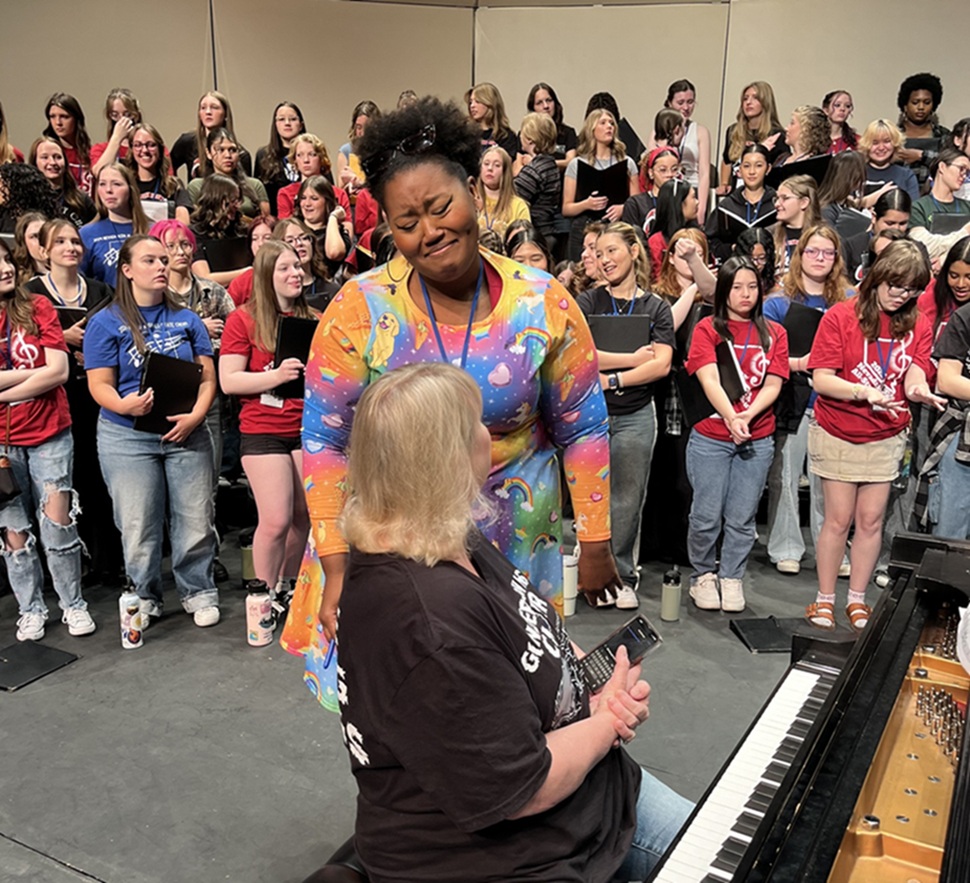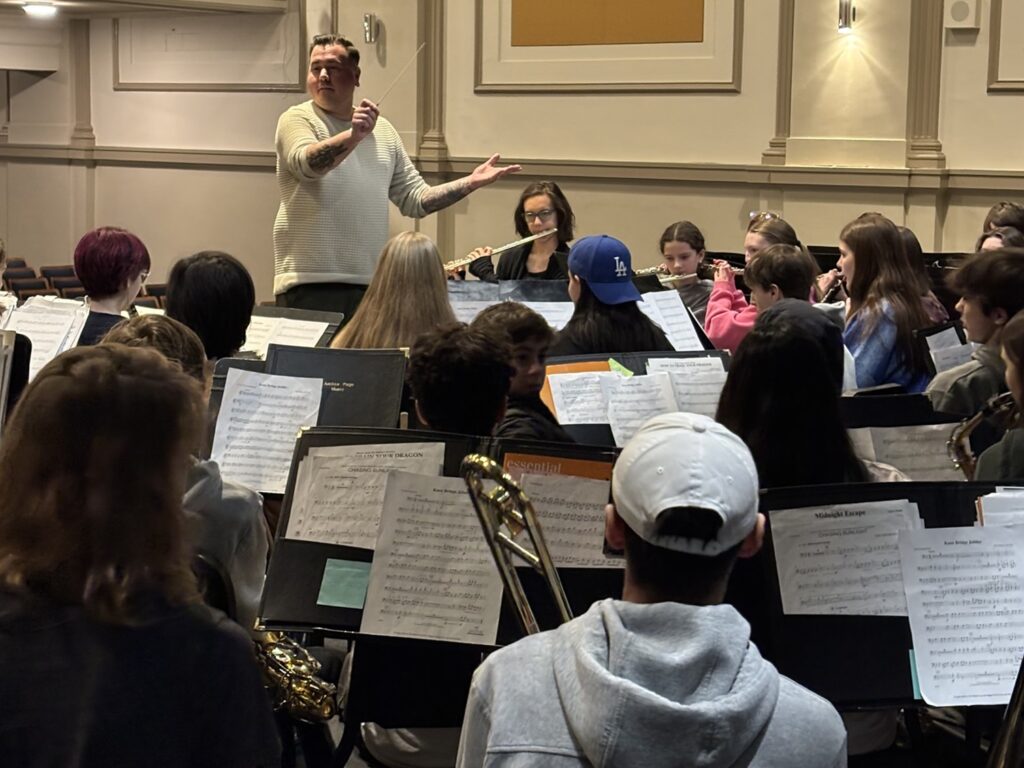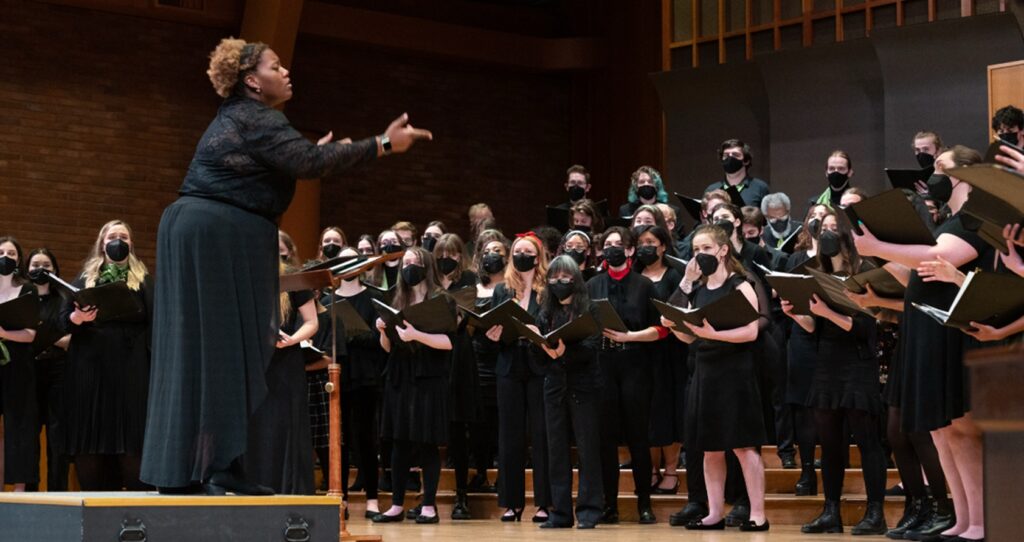Tagged Under:
The Magic in the Details
An Indiana music educator overcomes obstacles and fosters excellence in WGI.
In just five years, the Winter Guard International (WGI) indoor winds program at Westfield High School in Indiana, has progressed from competing in Scholastic A Class to competing in Scholastic World Class, in a transcendence that occurred during one of the most trying times for competitive band programs: the COVID pandemic. Because the program has progressed so quickly, some students have had the unique opportunity to perform in three different competitive classes — A Class, Open Class and World Class. In 2019, 8th-graders performing for Westfield competed in A Class; now, in 2024, those same students are high school seniors, spending their final year competing in World Class.
“I can’t think of other examples of programs that have grown so fast that students have had the opportunity to be there for every season to get to World Class,” says Westfield Director of Performing Arts Andrew Muth. “The kids bought into excellence.”
Muth attributes his program’s rapid growth to long-term planning, short-term goal-setting and a mindset focused on tackling one obstacle at a time. “What is excellent today isn’t excellent tomorrow,” Muth says. “The standard is going to grow and evolve.”
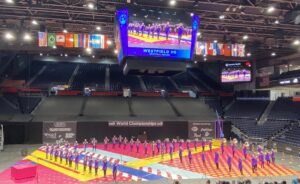
From Pandemic to Performances
Westfield’s indoor winds program first began during the 2019 school year. After just one year of competition, the 2020 COVID lockdowns ended the following season early. When students returned for the 2020-2021 school year, rehearsals faced a series of modifications, including requirements for students to wear masks, stand five feet apart and fill out health forms on an iPad to confirm they had no COVID symptoms before entering the rehearsal space.
The pandemic posed an obstacle to Westfield, as it did to every band program in America. However, despite a year of lost practice and competition time, the pandemic helped the students at Westfield develop a resilient mindset to come back even stronger.
Muth explains that band rehearsal was the highlight of the day for students and music teachers alike. Everyone was excited to return after months without practice. “For me personally, going to rehearsal, working with everybody, that felt normal. Even though we wore in masks, even though we were socially distancing, even though it wasn’t exactly how we wanted it to be, we were working on something together,” Muth says. “It felt so good to come back and do a rehearsal, even five feet apart in masks.”
A season without band served as a motivator. Muth, who was recognized as a 2024 Yamaha “40 Under 40” music educator, and his students learned a lot about how important it is not to take the band experience for granted. “We knew at any point our season could be done,” he says. “So, we were going to make the most of every single thing we did.”
THE YAMAHA EDUCATOR NEWSLETTER: Join to receive a round-up of our latest articles and programs!

A Well-Oiled Machine
Concepts like gratitude for each performance and taking responsibility for each day of practicing are not unique to the COVID lockdowns. Even years removed from the quarantine, Muth still stresses the importance of breaking down each piece of performance to its details. If each piece of the puzzle fits into place, it will create a whole. As a result, the Westfield indoor winds program has many pieces that work together like a well-oiled machine.
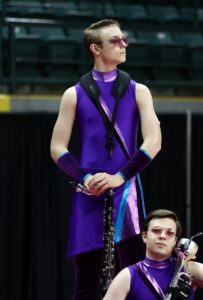
The first puzzle piece is nailing down each detail of the show with music selections, staging and costuming. “There’s no such thing as too detailed,” Muth says.
The next piece is making sure the band staff is working in tune with one another. Because of Westfield’s growth, the indoor winds staff has expanded from three members back in 2019 to 13 in 2024. New staff members include a recently hired choreographer, plus indoor winds alumni who Muth hired to help out.
The third piece of the puzzle is perhaps the most important, the students. Success for students, just like for staff, comes down to the details. Muth challenges his students to give their best effort during every step of the process, not just during their performances. “This includes [being] good at unloading and loading the trailer in the parking lot of the show,” Muth says. “We’re good at walking into warmup and setting up. We’re good at getting on the floor. We’re good at performing because obviously that’s the main goal, but everything matters. There’s not a detail of what we do that isn’t important.”
Parents are the last piece to complete the puzzle. If parents are fully on board with the commitment that the indoor winds program requires, they play an important role in helping the students perform to their full potential.
As the program has grown, parents’ initiative has grown as well. While five years ago, parents were volunteering to learn the process, parents are now making their own suggestions for improvement. Without being asked, Westfield band parents regularly take on tasks like setting up pre-performance meals in the parking lot, organizing uniform dry cleanings between shows, and noticing when to alter uniforms to fit better. “They’re constantly raising their own bar, just like the kids are,” Muth says.
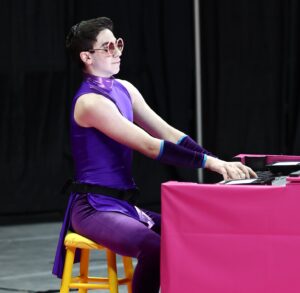
Marching One Step at a Time
In addition to the importance of teamwork, Muth emphasizes that progress is slow and gradual, but it’s important to embrace every step of the process. “It’s an old saying, but it’s true: Rome wasn’t built in a day,” Muth says.
Muth doesn’t focus on making the first performance perfect; instead, he looks to establish good habits and patterns for long-term growth. “We’re a slow burn, and we know that,” he says. “The Westfield band you see in week one is not the band you’ll see at the end of the season.”
Part of Muth’s growth as an instructor has come from understanding the hierarchy of the band’s priorities. “When I was a 23-year-old band director, I wanted to fight every fight and die on every hill,” Muth recalls. However, during his teaching career, Muth realized: “It’s about the war, not the battle. You can’t die on every hill. You must take it in parts and pieces.”
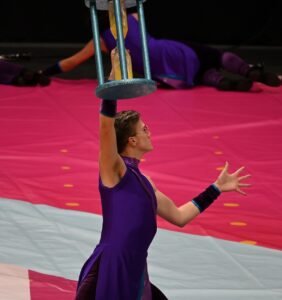
Setting Goals
Those parts and pieces often go back to the basics — a regular focus on improving marching technique and music rehearsals. For Muth, those pieces also include being willing to delegate more tasks among staff. “I’ve let go of a lot of things that I used to be responsible for,” he says.
Instead of trying to lead every piece of the program himself, Muth spends time training staff members to take on more responsibility. “We’re not only educating our students,” he says. “We’re educating our staff.
Goals for students must be tangible, measurable benchmarks. “Students can say, ‘I want to play better. I want to move better,’” he says. “But what are some larger, big ticket boxes that we can check?”
For example, during the program’s third year, Muth and his students set a goal to make it to WGI finals. After accomplishing that goal, Westfield won Open Class during year four. “It was never the goal to win,” Muth says. “The goal was to be in a place where it could happen, where we had the level of training and excellence where [winning] was in the cards for us.”
To reach those goals, Muth recommends forming mentorships and alliances with other schools and their band directors, plus going to watch other schools’ rehearsals. “I haven’t yet met a successful band director who is not willing to let you come in, watch the rehearsal and see how the sausage gets made,” Muth says.
Watching other bands rehearse can help a band director identify areas where their own band has similar struggles. “It’s eye-opening. You’re like, ‘Oh! They’re telling their kids to play in the key signature and get their toes up just like we’re doing,’” Muth says. “It contextualizes it for you and makes you realize that you’re not alone.”











